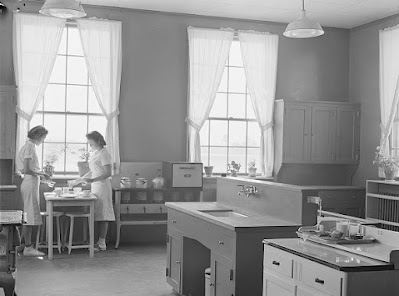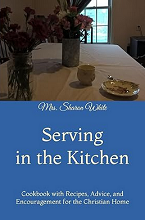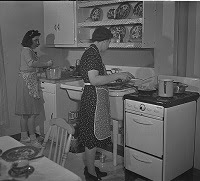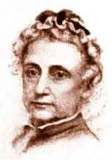 |
| Library of Congress: Setting the table in home economics class, South Carolina, 1939 |
When Homemakers Learn The Science of Keeping a Home, Society Benefits.
Keeping the home is a challenging career in itself. We are not unemployed, living in leisure. We have daily work that keeps us busy. It is important that we are trained in the scientific arts of home economics. Here are just some of the things we need to do:
1. Operate and maintain appliances. We also need to understand how new models work and see if they will make our homes more efficient - both in saving labor and money.
2. We need to learn nutrition. This is for the health of our families. This includes our choices in the grocery store, our meal planning, our baking and cooking. We must have basic cooking and shopping skills.
3. Basic Medical Care. We are lay-nurses. We must know how to handle colds, fevers, and minor injuries.
4. Child Care and Development. We need to know the basics of caring for a baby, toddler, child, teenager and young adult.
5. Basic Sewing. We need to be able to, at the very least, repair clothes and sew on buttons. Making clothes for the family, or sewing drapes, and doing embroidery work, etc. are nice, but not essential in today's homes.
6. Laundry and Cleaning. To run a sanitary, efficient home, we must learn the basics of laundry and how to clean a house.
What if you don't know any of this stuff and are struggling at home?
In the early part of the 1900's, homemakers clubs were available in many towns throughout the United States. This was where the women would get together to learn from one another. In my local town's Historical Society, there is a photograph of a group of mothers in a homemaker's club in the 1930's. Their support of one another was wonderful!
Today, we can join quilting clubs, cooking clubs and the like. We can also read books, watch videos and learn in many different ways. The important thing to remember is that we must always continue to sharpen our skills and learn because changes in modern culture and technology affect our work at home.
Some Quotes from the Experts:
-----------------------
"Home economics should find its way into the curriculum of every school because the scientific study of a problem pertaining to food, shelter or clothing… raises manual labor that might be drudgery to the plane of intelligent effort that is always self-respecting…Home economics is not one department, in the sense in which dairying or entomology or soils is a department. It is not a single specialty… Many technical and educational departments will grow out of it as time goes on."
Martha Van Rensselaer (1913)
Professor of Home Economics and Co-Director of the New York State College of Home Economics
--------------------------
"From the broad view of intelligent statecraft, the state will find an education in home economics a tool of the utmost importance in building up forces which increase physical well-being of the population and which make for a reduction in the number of persons thrown back to the state for support by reason of physical, mental, or moral failure."
Albert R, Mann (1930)
Dean, New York State College of Agriculture
--------------------------
"Home-making today should have a background of scientific training because only in this way can real efficiency be achieved. The average girl wants to be able to keep her house with the least possible strain, and in order to do this she must have good training. This can best be achieved by taking a good course in home economics."
Eleanor Roosevelt (1933)
First Lady
-------------------------------------
Blessings
Mrs. White
- To find out more about this blog, or Mrs. White, please visit our About page. -
Every home can be a homeschool!
Find confidence and courage in teaching your own children at home with Mrs. White's book,
Seeking a Thrifty and Simple Life.
112 pages, paperback.



























7 comments:
This is a great list to know. I didn't learn all of that, most of it really. and have had a hard time teaching myself. I've come a long way the past 10 years!
I so agree with the importance of home-ec. When I was in high school, home-ec was viewed as archaic and out-dated by many. Now that I'm a wife and mom, I can see how vital the knowledge is. I was very disappointed one time when I looked at a list of college courses, hoping to find home-ec type classes. The practical courses were gone and in their place was a cirriculum of political correctness and social activism. I can see the tends changing as our economy draws women back to the home and I am so glad! Great post today..........Denise
It takes about a month to learn all of this--the whole list. If you didn't learn it as a girl, you can easily learn it as an adult. It is not that hard, really.
I love all the old photos you show on your site. They show homemaking in such a graceful, pleasent looking way :-)
Great post! Thanks for stopping by my blog! Merry Christmas. Thanks goodness for the internet! It's always my go-to when I have a question!
When I was in high school, the Home Ec classes were already done away with due to budget cuts. I still managed to take sewing and cooking and also accounting.
The rest I learned from my mother and also experience. I still am constantly changing my homemaking routine as I read or discover new ideas and such.
I would love to see Home Ec back in the school system.If I ever am blessed with a daughter, I will definitely educate her on all matters of the home.
Lovely post!
and now we have our fellow bloggers to point the way ...
Post a Comment